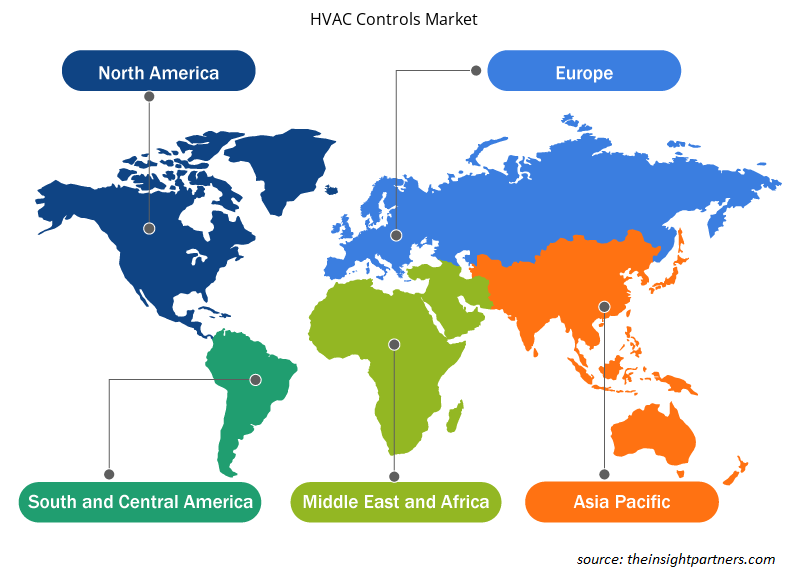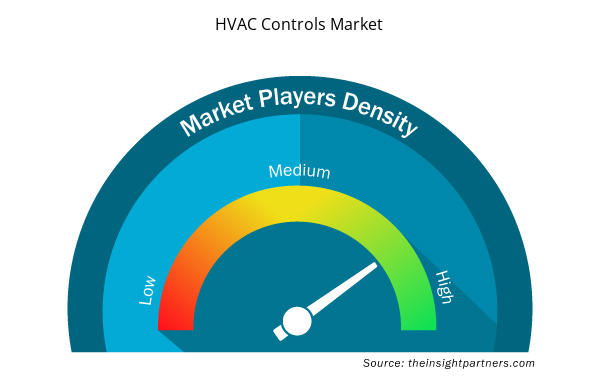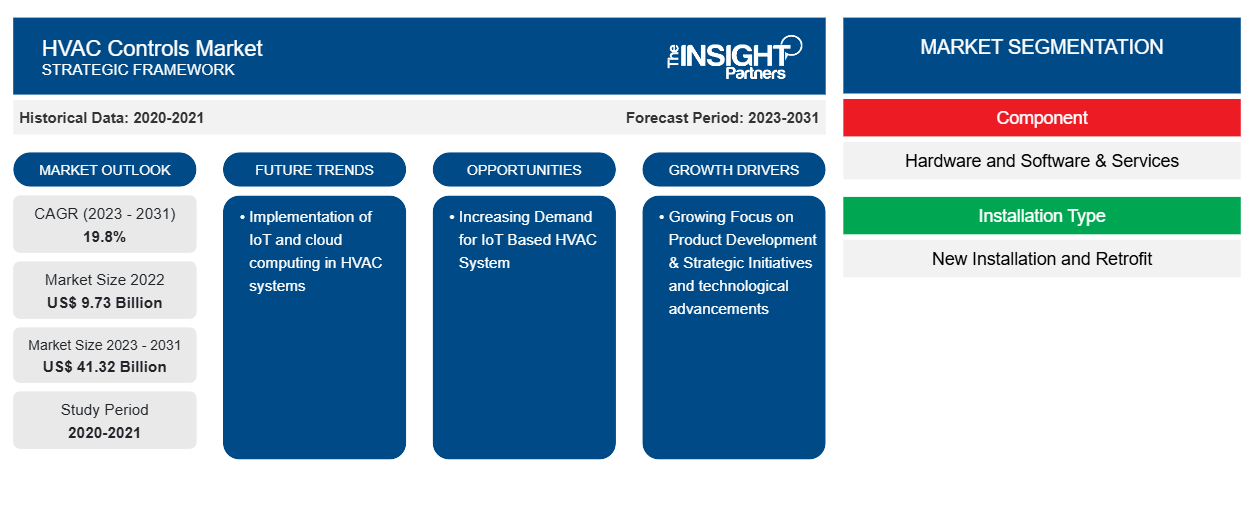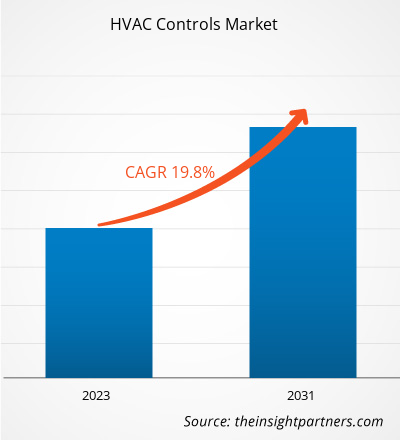من المتوقع أن ينمو سوق التحكم في التدفئة والتهوية وتكييف الهواء من 9.73 مليار دولار أمريكي في عام 2022 إلى 41.32 مليار دولار أمريكي بحلول عام 2030؛ ومن المتوقع أن يتوسع بمعدل نمو سنوي مركب قدره 19.8٪ من عام 2022 إلى عام 2030. ومن المتوقع أن يكون تنفيذ إنترنت الأشياء والحوسبة السحابية في أنظمة التدفئة والتهوية وتكييف الهواء اتجاهًا رئيسيًا في السوق.
تحليل سوق أدوات التحكم في التدفئة والتهوية وتكييف الهواء
أصبحت أنظمة التحكم في التدفئة والتهوية وتكييف الهواء المستندة إلى السحابة هي مستقبل إدارة المباني الفعّالة والذكية. توفر هذه التقنيات، التي تستفيد من قوة الإنترنت وإنترنت الأشياء (IoT)، حقبة جديدة من الأداء المحسّن، وانخفاض استخدام الطاقة، والراحة التي لا مثيل لها. تلتقط الحلول المستندة إلى السحابة بيانات في الوقت الفعلي حول درجات الحرارة والرطوبة ومعدلات الإشغال. ثم تقوم الخوارزميات القوية بتحليل هذه البيانات لتحسين أداء التدفئة والتهوية وتكييف الهواء. من خلال تعلم أنماط الاستخدام وتوقع المطالب، يمكن للنظام تعديل الإعدادات تلقائيًا لتوفير الراحة مع تقليل استهلاك الطاقة. وبالتالي، من المتوقع أن ينمو الطلب على الحوسبة السحابية في أنظمة التدفئة والتهوية وتكييف الهواء خلال فترة التنبؤ.
نظرة عامة على صناعة سوق أدوات التحكم في التدفئة والتهوية وتكييف الهواء
HVAC تعني التدفئة والتهوية وتكييف الهواء. إنه نظام للتحكم في درجة حرارة ورطوبة المساحة عن طريق تحريك الهواء في الداخل والخارج . تم تصميم وحدات التحكم في التدفئة والتهوية وتكييف الهواء لتلبية الاحتياجات البيئية المتغيرة والتعامل مع أسوأ السيناريوهات. هناك العديد من العوامل التي تؤثر على استخدام التحكم في التدفئة والتهوية وتكييف الهواء مثل تقلبات الرطوبة وإشغال المباني والأحمال الحرارية الشمسية والمعدات الجديدة وغيرها. يمكن برمجة عناصر التحكم في التدفئة والتهوية وتكييف الهواء هذه، مما يسمح بالتطبيقات المخصصة. تقوم المدخلات التناظرية في عناصر التحكم في التدفئة والتهوية وتكييف الهواء بتقييم درجة الحرارة أو الرطوبة أو الضغط، بينما تتحكم المدخلات الرقمية في تدفق الهواء بناءً على إعدادات مثل الساخن أو البارد.
قم بتخصيص هذا التقرير ليناسب متطلباتك
ستحصل على تخصيص لأي تقرير - مجانًا - بما في ذلك أجزاء من هذا التقرير، أو تحليل على مستوى الدولة، وحزمة بيانات Excel، بالإضافة إلى الاستفادة من العروض والخصومات الرائعة للشركات الناشئة والجامعات
- احصل على أهم اتجاهات السوق الرئيسية لهذا التقرير.ستتضمن هذه العينة المجانية تحليلاً للبيانات، بدءًا من اتجاهات السوق وحتى التقديرات والتوقعات.
محركات سوق التحكم في التدفئة والتهوية وتكييف الهواء والفرص المتاحة
التركيز المتزايد على تطوير المنتجات والمبادرات الاستراتيجية لتعزيز نمو السوق
ومن المتوقع أن يؤدي التركيز المتزايد على تطوير المنتجات والمبادرات الاستراتيجية إلى دفع نمو السوق. على سبيل المثال، في مارس 2022، أعلنت شركة Automated Logic، وهي شركة تابعة لشركة Carrier Global Corporation، عن إضافة طرازي وحدات التحكم VAV OF342 وOR141 إلى خط التحكم الرقمي OptiFlex الحالي في المباني. هذه وحدات التحكم فعالة في التحكم في جودة الهواء وتطبيقات درجة الحرارة على مستوى المنطقة. علاوة على ذلك، في مايو 2022، أعلنت شركة Daikin عن استثمارها الأخير في شركة Wlab Ltd.، وهي شركة ناشئة توفر أجهزة استشعار للكشف عن الحساسية المحمولة جوًا. من شأن هذا الاستثمار أن يسرع من نمو شركة Daikin في حلول أعمال تكييف الهواء.
تزايد الطلب على أنظمة التدفئة والتهوية وتكييف الهواء المعتمدة على إنترنت الأشياء
من المرجح أن يؤدي الطلب المتزايد على أنظمة التدفئة والتهوية وتكييف الهواء الموفرة للطاقة، والطلب المتزايد على استبدال أنظمة التدفئة والتهوية وتكييف الهواء، وتسريع التقدم القائم على البنية التحتية إلى تعزيز نمو الصناعة في المستقبل. تعمل شركات تصنيع أنظمة التدفئة والتهوية وتكييف الهواء بجد لتزويد المستهلكين بأنظمة التدفئة والتهوية وتكييف الهواء الذكية وزيادة حصتها في السوق. في أي منشأة تجارية أو سكنية، تستهلك الأضواء وأنظمة التدفئة والتهوية وتكييف الهواء معظم الطاقة. ومن المتوقع أن يؤدي تنفيذ إنترنت الأشياء في هذه التطبيقات وتمكين الاتصال بين الآلات (M2M) إلى توفير التكاليف، والحفاظ على الموارد، والصيانة التنبؤية، والتحكم في الراحة، وتحسين أداء المباني . وبالتالي، من المتوقع أن ينمو الطلب على أنظمة التحكم في التدفئة والتهوية وتكييف الهواء التي تدعم إنترنت الأشياء خلال فترة التنبؤ.
تقرير تحليل تجزئة سوق أدوات التحكم في التدفئة والتهوية وتكييف الهواء
تتمثل القطاعات الرئيسية التي ساهمت في اشتقاق تحليل سوق أدوات التحكم في التدفئة والتهوية وتكييف الهواء في التغطية حسب التشغيل ونوع المنتج ونوع الركيزة والاستخدام النهائي.
- بناءً على المكون، يتم تقسيم السوق إلى أجهزة وبرامج وخدمات.
- اعتمادًا على نوع التثبيت، يتم تقسيم السوق إلى تثبيت جديد وتحديث.
- وفقًا للنظام، يتم تقسيم السوق إلى نظام التحكم في درجة الحرارة، ونظام التحكم في الرطوبة، ونظام التحكم في التهوية، ونظام التحكم المتكامل.
- اعتمادًا على المستخدم النهائي، يتم تقسيم السوق إلى سكني وتجاري وصناعي.
ضوابط التدفئة والتهوية وتكييف الهواء
تحليل حصة السوق حسب المنطقة الجغرافية
على أساس المنطقة، يتم تقسيم السوق إلى أمريكا الشمالية وأوروبا ومنطقة آسيا والمحيط الهادئ والشرق الأوسط وأفريقيا وأمريكا الجنوبية والوسطى.
شهدت صناعة أدوات التحكم في التدفئة والتهوية وتكييف الهواء في أمريكا الشمالية توسعًا كبيرًا، مدفوعًا بالحاجة إلى التشغيل البيني، والاتصال، وتكامل الشبكة، وتحليل البيانات، وتكامل النظام. تتصل أنظمة التدفئة والتهوية وتكييف الهواء المستندة إلى السحابة بسهولة بتقنيات المباني الذكية الأخرى مثل الإضاءة والأمان. يتيح هذا النظام البيئي المتكامل إدارة أكثر شمولاً للمباني، وتحسين كفاءة الطاقة وخلق بيئة عمل أو معيشة ذكية بالكامل. ومن المتوقع أن تعزز كل هذه العوامل نمو سوق أدوات التحكم في التدفئة والتهوية وتكييف الهواء في أمريكا الشمالية خلال فترة التنبؤ.
رؤى إقليمية حول سوق أدوات التحكم في التدفئة والتهوية وتكييف الهواء
لقد قام المحللون في Insight Partners بشرح الاتجاهات والعوامل الإقليمية المؤثرة على سوق أدوات التحكم في التدفئة والتهوية وتكييف الهواء طوال فترة التوقعات بشكل شامل. يناقش هذا القسم أيضًا قطاعات سوق أدوات التحكم في التدفئة والتهوية وتكييف الهواء والجغرافيا في جميع أنحاء أمريكا الشمالية وأوروبا ومنطقة آسيا والمحيط الهادئ والشرق الأوسط وأفريقيا وأمريكا الجنوبية والوسطى.

- احصل على البيانات الإقليمية المحددة لسوق أدوات التحكم في التدفئة والتهوية وتكييف الهواء
نطاق تقرير سوق أدوات التحكم في التدفئة والتهوية وتكييف الهواء
| سمة التقرير | تفاصيل |
|---|---|
| حجم السوق في عام 2022 | 9.73 مليار دولار أمريكي |
| حجم السوق بحلول عام 2030 | 41.32 مليار دولار أمريكي |
| معدل النمو السنوي المركب العالمي (2023 - 2031) | 19.8% |
| البيانات التاريخية | 2020-2021 |
| فترة التنبؤ | 2023-2031 |
| القطاعات المغطاة | حسب المكون
|
| المناطق والدول المغطاة | أمريكا الشمالية
|
| قادة السوق وملفات تعريف الشركات الرئيسية |
|
كثافة اللاعبين في سوق ضوابط التدفئة والتهوية وتكييف الهواء: فهم تأثيرها على ديناميكيات الأعمال
يشهد سوق أدوات التحكم في التدفئة والتهوية وتكييف الهواء نموًا سريعًا، مدفوعًا بالطلب المتزايد من المستخدم النهائي بسبب عوامل مثل تفضيلات المستهلكين المتطورة والتقدم التكنولوجي والوعي المتزايد بفوائد المنتج. ومع ارتفاع الطلب، تعمل الشركات على توسيع عروضها والابتكار لتلبية احتياجات المستهلكين والاستفادة من الاتجاهات الناشئة، مما يؤدي إلى زيادة نمو السوق.
تشير كثافة اللاعبين في السوق إلى توزيع الشركات أو المؤسسات العاملة في سوق أو صناعة معينة. وهي تشير إلى عدد المنافسين (اللاعبين في السوق) الموجودين في مساحة سوق معينة نسبة إلى حجمها أو قيمتها السوقية الإجمالية.
الشركات الرئيسية العاملة في سوق ضوابط التدفئة والتهوية وتكييف الهواء هي:
- الناقل
- دايكن
- دلتا كنترولز
- شركة ديستيك كنترول
- شركة إيمرسون الكهربائية
- شركة هونيويل الدولية
إخلاء المسؤولية : الشركات المذكورة أعلاه ليست مرتبة بأي ترتيب معين.

- احصل على نظرة عامة على أهم اللاعبين الرئيسيين في سوق أدوات التحكم في التدفئة والتهوية وتكييف الهواء
أخبار سوق أدوات التحكم في التدفئة والتهوية وتكييف الهواء والتطورات الأخيرة
يتم تقييم سوق أدوات التحكم في التدفئة والتهوية وتكييف الهواء من خلال جمع البيانات النوعية والكمية بعد البحث الأولي والثانوي، والتي تتضمن منشورات الشركات المهمة وبيانات الجمعيات وقواعد البيانات. فيما يلي بعض التطورات في سوق أدوات التحكم في التدفئة والتهوية وتكييف الهواء:
- ترفع Daikin Cloud Plus مستوى التحكم في أنظمة التدفئة والتهوية وتكييف الهواء للمباني التجارية إلى المستوى التالي. كشفت شركة Daikin عن Daikin Cloud Plus، وهي أداة جديدة قوية تتيح لمديري المرافق والفنيين ومالكي المباني ومستشاري الطاقة التحكم عن بُعد في أنظمة التدفئة والتهوية وتكييف الهواء وتحسينها من أجل راحة شاغليها والأداء البيئي طوال دورة حياة المبنى. (المصدر: Daikin، بيان صحفي، أبريل 2024)
تقرير سوق أدوات التحكم في التدفئة والتهوية وتكييف الهواء - التغطية والنتائج
يتم تقدير توقعات سوق أدوات التحكم في التدفئة والتهوية وتكييف الهواء بناءً على نتائج بحثية ثانوية وأولية مختلفة، مثل منشورات الشركات الرئيسية وبيانات الجمعيات وقواعد البيانات. يوفر تقرير السوق "حجم سوق أدوات التحكم في التدفئة والتهوية وتكييف الهواء والتوقعات (2020-2030)" تحليلاً مفصلاً للسوق يغطي المجالات التالية-
- حجم سوق أدوات التحكم في التدفئة والتهوية وتكييف الهواء وتوقعاتها على المستويات العالمية والإقليمية والوطنية لجميع قطاعات السوق الرئيسية التي يغطيها النطاق
- اتجاهات سوق أدوات التحكم في التدفئة والتهوية وتكييف الهواء، بالإضافة إلى ديناميكيات السوق مثل العوامل المحركة والقيود والفرص الرئيسية
- تحليل مفصل لقوى PEST/Porter الخمس وSWOT
- تحليل سوق أدوات التحكم في التدفئة والتهوية وتكييف الهواء يغطي اتجاهات السوق الرئيسية والإطار العالمي والإقليمي والجهات الفاعلة الرئيسية واللوائح والتطورات الأخيرة في السوق
- تحليل المشهد الصناعي والمنافسة الذي يغطي تركيز السوق، وتحليل خريطة الحرارة، واللاعبين البارزين، والتطورات الأخيرة في سوق أدوات التحكم في التدفئة والتهوية وتكييف الهواء
- ملفات تعريفية مفصلة للشركة.
- التحليل التاريخي (سنتان)، السنة الأساسية، التوقعات (7 سنوات) مع معدل النمو السنوي المركب
- تحليل PEST و SWOT
- حجم السوق والقيمة / الحجم - عالميًا وإقليميًا وقطريًا
- الصناعة والمنافسة
- مجموعة بيانات Excel


- Nurse Call Systems Market
- Tortilla Market
- Legal Case Management Software Market
- Emergency Department Information System (EDIS) Market
- Point of Care Diagnostics Market
- Sleep Apnea Diagnostics Market
- Nuclear Waste Management System Market
- Visualization and 3D Rendering Software Market
- Aquaculture Market
- Ceiling Fans Market

Report Coverage
Revenue forecast, Company Analysis, Industry landscape, Growth factors, and Trends

Segment Covered
This text is related
to segments covered.

Regional Scope
North America, Europe, Asia Pacific, Middle East & Africa, South & Central America

Country Scope
This text is related
to country scope.
الأسئلة الشائعة
The report can be delivered in PDF/PPT format; we can also share an Excel dataset based on the request.
Carrier, Daikin, Delta Controls, Distech Control Inc., Emerson Electric Co., Honeywell International Inc., Johnson Controls, Lennox International Inc., Siemens, and Schneider Electric are the major market players.
The Global HVAC controls market was estimated to be US$ 9.73 billion in 2022 and is expected, to grow at a CAGR of 19.8% during the forecast period 2022 - 2030.
The global HVAC Controls market was estimated to grow at a CAGR of 19.8% during 2022 - 2030.
Implementation of IoT and cloud computing in HVAC systems are the major trends in the market.
Growing focus on product development, strategic initiatives and technological advancements are the major factors that drive the global HVAC Controls market.
Trends and growth analysis reports related to Electronics and Semiconductor : READ MORE..
The List of Companies - HVAC Controls Market
- Acuity brands inc.
- Lennox international Inc.
- Johnson Controls
- Honeywell
- Siemens
- Schneider Electric
- Emerson
- Carrier
- Daikin
- Delta Controls
The Insight Partners performs research in 4 major stages: Data Collection & Secondary Research, Primary Research, Data Analysis and Data Triangulation & Final Review.
- Data Collection and Secondary Research:
As a market research and consulting firm operating from a decade, we have published and advised several client across the globe. First step for any study will start with an assessment of currently available data and insights from existing reports. Further, historical and current market information is collected from Investor Presentations, Annual Reports, SEC Filings, etc., and other information related to company’s performance and market positioning are gathered from Paid Databases (Factiva, Hoovers, and Reuters) and various other publications available in public domain.
Several associations trade associates, technical forums, institutes, societies and organization are accessed to gain technical as well as market related insights through their publications such as research papers, blogs and press releases related to the studies are referred to get cues about the market. Further, white papers, journals, magazines, and other news articles published in last 3 years are scrutinized and analyzed to understand the current market trends.
- Primary Research:
The primarily interview analysis comprise of data obtained from industry participants interview and answers to survey questions gathered by in-house primary team.
For primary research, interviews are conducted with industry experts/CEOs/Marketing Managers/VPs/Subject Matter Experts from both demand and supply side to get a 360-degree view of the market. The primary team conducts several interviews based on the complexity of the markets to understand the various market trends and dynamics which makes research more credible and precise.
A typical research interview fulfils the following functions:
- Provides first-hand information on the market size, market trends, growth trends, competitive landscape, and outlook
- Validates and strengthens in-house secondary research findings
- Develops the analysis team’s expertise and market understanding
Primary research involves email interactions and telephone interviews for each market, category, segment, and sub-segment across geographies. The participants who typically take part in such a process include, but are not limited to:
- Industry participants: VPs, business development managers, market intelligence managers and national sales managers
- Outside experts: Valuation experts, research analysts and key opinion leaders specializing in the electronics and semiconductor industry.
Below is the breakup of our primary respondents by company, designation, and region:

Once we receive the confirmation from primary research sources or primary respondents, we finalize the base year market estimation and forecast the data as per the macroeconomic and microeconomic factors assessed during data collection.
- Data Analysis:
Once data is validated through both secondary as well as primary respondents, we finalize the market estimations by hypothesis formulation and factor analysis at regional and country level.
- Macro-Economic Factor Analysis:
We analyse macroeconomic indicators such the gross domestic product (GDP), increase in the demand for goods and services across industries, technological advancement, regional economic growth, governmental policies, the influence of COVID-19, PEST analysis, and other aspects. This analysis aids in setting benchmarks for various nations/regions and approximating market splits. Additionally, the general trend of the aforementioned components aid in determining the market's development possibilities.
- Country Level Data:
Various factors that are especially aligned to the country are taken into account to determine the market size for a certain area and country, including the presence of vendors, such as headquarters and offices, the country's GDP, demand patterns, and industry growth. To comprehend the market dynamics for the nation, a number of growth variables, inhibitors, application areas, and current market trends are researched. The aforementioned elements aid in determining the country's overall market's growth potential.
- Company Profile:
The “Table of Contents” is formulated by listing and analyzing more than 25 - 30 companies operating in the market ecosystem across geographies. However, we profile only 10 companies as a standard practice in our syndicate reports. These 10 companies comprise leading, emerging, and regional players. Nonetheless, our analysis is not restricted to the 10 listed companies, we also analyze other companies present in the market to develop a holistic view and understand the prevailing trends. The “Company Profiles” section in the report covers key facts, business description, products & services, financial information, SWOT analysis, and key developments. The financial information presented is extracted from the annual reports and official documents of the publicly listed companies. Upon collecting the information for the sections of respective companies, we verify them via various primary sources and then compile the data in respective company profiles. The company level information helps us in deriving the base number as well as in forecasting the market size.
- Developing Base Number:
Aggregation of sales statistics (2020-2022) and macro-economic factor, and other secondary and primary research insights are utilized to arrive at base number and related market shares for 2022. The data gaps are identified in this step and relevant market data is analyzed, collected from paid primary interviews or databases. On finalizing the base year market size, forecasts are developed on the basis of macro-economic, industry and market growth factors and company level analysis.
- Data Triangulation and Final Review:
The market findings and base year market size calculations are validated from supply as well as demand side. Demand side validations are based on macro-economic factor analysis and benchmarks for respective regions and countries. In case of supply side validations, revenues of major companies are estimated (in case not available) based on industry benchmark, approximate number of employees, product portfolio, and primary interviews revenues are gathered. Further revenue from target product/service segment is assessed to avoid overshooting of market statistics. In case of heavy deviations between supply and demand side values, all thes steps are repeated to achieve synchronization.
We follow an iterative model, wherein we share our research findings with Subject Matter Experts (SME’s) and Key Opinion Leaders (KOLs) until consensus view of the market is not formulated – this model negates any drastic deviation in the opinions of experts. Only validated and universally acceptable research findings are quoted in our reports.
We have important check points that we use to validate our research findings – which we call – data triangulation, where we validate the information, we generate from secondary sources with primary interviews and then we re-validate with our internal data bases and Subject matter experts. This comprehensive model enables us to deliver high quality, reliable data in shortest possible time.


 احصل على عينة مجانية لهذا التقرير
احصل على عينة مجانية لهذا التقرير